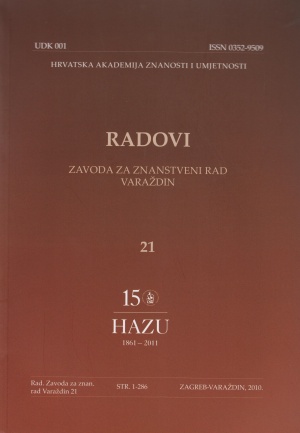HRVATSKA GLAZBENA BAŠTINA NA VARAŽDINSKIM BAROKNIM VEČERIMA OGLEDI O TRANSKRIPCIJAMA I REDAKCIJAMA: ENNIO STIPČEVIĆ
CROATIAN MUSICAL HERITAGE AT THE VARAŽDIN BAROQUE EVENINGS – EXAMPLES OF TRANSCRIPTIONS AND EDITIONS: ENNIO STIPČEVIĆ
Author(s): Zdenka WeberSubject(s): Music
Published by: Hrvatska akademija znanosti i umjetnosti - Zavod za znanstveni rad Varaždin
Keywords: Baroque music; Croatian Baroque music; Varaždin Baroque Evenings; transcriptions and editions; Tomaso Cecchini; Leopold Ignacije Ebner; Johann Petrus Jakob Haibel; Atanazije Jurjević; Ivan Lukačić; Damjan Nembri; Gabriello Puliti; Francesco Sponga-Uspe
Summary/Abstract: In all the years following his bachelor’s (1983) and master’s degree (1986) at the Academy of Music in Zagreb, and his doctorate obtained from the Faculty of Philosophy in Zagreb (1993), the Croatian musicologist Ennio Stipčević, (Zagreb, 1959) has been intensely dedicated to research into Early music. Early Croatian music, archive research and music paleography form the centre of his scientific activities. An added bonus to his musicological research is provided by his place of work at the Croatian Academy of Sciences and Arts (Department of History of Croatian Music), where he is currently holding the post of senior researcher. In addition to research, Stipčević is also involved in pedagogical work. He has taught musicological subjects at the Academy of Music in Zagreb since 1994 and at Croatian Studies since 1997. In 1986, he prepared a symposium on music baroque in Croatia within Osor Music Evenings. Papers from this scientific gathering were published in the Almanac of Music Baroque in Croatia (Osor: OGV, 1989). Thanks to Stipčević’s reputation as a serious and hard-working researcher, he received scholarships that allowed him to make study trips to Venice and Rome (1987), Graz (1992), Florence (1994), and Paris (1995). As a recipient of a prestigeous Fulbright Scholarship, he spent the academic year 1996/97at Yale University (New Haven, USA) as a visiting scholar. Since 1999, he has been a fellow at Villa I Tatti in Florence (The Harvard University Centre for Italian Renaissance Studies), while since 2006 he has cooperated with Centre d’Études Supérieures de la Renaissance in Tours. He has been an associated member of the Croatian Academy of Sciences and Arts since 1994 (re-elected in 2004). About sixty scientific papers, including thirteen books and some twenty scores published to date, testify the exceptional scientific inquisitiveness, perseverance and discipline in research, but also the considerable luck in discovering valuable manuscripts and documents with which Stipčević steadfastly adds to the mosaic of primarily Croatian musical history of the 16th, 17th and 18th centuries. It is owing to the results of his work, particularly after the death of his mentor and the most deserving advocate of Croatian Early music, Academician Lovro Županović (Šibenik, 1925 – Zagreb, 2004), that Stipčević has become one of the most distinguished associates of Varaždin Baroque Evenings. With the tradition of first modern performances of works of Croatian late Renaissance and Baroque music, the festival in Varaždin continues to play the pivotal role in the affirmation of forgotten and newly discovered works of Croatian musical heritage. The transcription of a movement from the Mass in A Major, Agnus Dei II, by the Austrian composer Johann Petrus Jacob Haibel (Graz, 1762 – Đakovo, 1826) which Stipčević presented at the 13th Varaždin Baroque Evenings in 1983, shortly after his graduation, marked the beginning of a fruit
Journal: Radovi Zavoda za znanstveni rad Varaždin
- Issue Year: 2010
- Issue No: 21
- Page Range: 131-161
- Page Count: 30
- Language: Croatian

